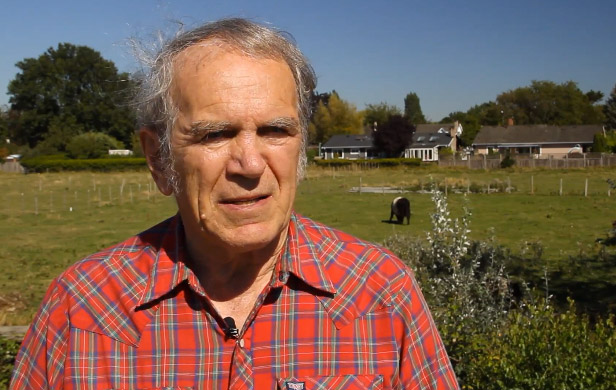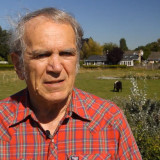
VANCOUVER – A leaked cabinet document that proposes significant changes to British Columbia’s Agricultural Land Reserve — millions of hectares of cherished farmland that have been largely protected from development for decades — prompted swift denials Thursday from the provincial government and left proponents of the program with uneasy questions about its future.
The Globe and Mail published a story based on cabinet documents that reportedly outline a proposal from Agriculture Minister Pat Pimm to “modernize” the Agricultural Land Commission, the Crown agency that manages the land reserve.
Gas before food
Among other things, the proposal would see the Agricultural Land Commission cease to be an independent agency, instead coming under the control of the Agriculture Ministry, while handing “primary authority” to authorize industrial activity on agricultural land to the B.C. Oil and Gas Commission, the newspaper reported.
The documents were prepared as part of a so-called “core review” of government operations, launched earlier this year in a bid to trim the provincial budget, and the cabinet minister in charge of that review responded Thursday by ruling out many of the most controversial aspects of the leaked proposal.
Minister downplays concerns
Bill Bennett, who is also the minister of energy and mines, said the Globe and Mail story was based on an “older document” that has since been rejected. He said the government has ruled out shifting the commission’s duties to the agriculture minister or handing over more decision-making authority to the oil and gas regulator. Said Bennett in an interview:
[quote]We certainly have no plans to bring the commission inside government or tamper with the independence of the commission, and we have no plans to undermine the central principle of the reserve, which is the protection of good quality farmland.[/quote]
Bennett noted the B.C. Oil and Gas Commission has had the power to approve certain applications on land within the Agricultural Land Reserve for nearly a decade through a document known as a “delegation agreement,” which was last updated earlier this year.
“If there were changes made (to the agreement), they would be quite minor; we’re not looking at anything close to what the reporter described in his article.”
Bennett downplayed the significance of Pimm’s proposal, suggesting it was little more than one of many ideas he and his Liberal government colleagues have considered as part of the core review process.
However, Bennett’s comments did little to assure supporters of the land reserve, which was created in the mid-1970s by the NDP government of the day amid concerns that the province’s farmland was rapidly disappearing.
40-year-old ALR fiercely defended
The reserve is made up of 4.7 million hectares of land throughout the province on which agriculture is given top priority. Strict controls are placed on non-agricultural uses and under what circumstances land can be taken out of the reserve.
The Agricultural Land Reserve is one of the most fiercely defended institutions in the province, with advocates routinely raising concerns that private businesses — whether through property development or oil and gas projects — have been able to whittle away at protected farmland.
Those fears have persisted despite the provincial government’s repeated insistence it has no plans to gut the reserve. Earlier this year, the government added $4 million to the Agricultural Land Commission’s budget over the next three years.
Father of the ALR weighs in
Harold Steves, who as an NDP member of the legislature in the 1970s is credited as one of the land reserve’s co-founders, said he’s convinced the Liberal government is searching for ways to weaken the reserve and the commission that protects it.
“I’m not confident at all,” said Steves, who is now a city councillor in Richmond, south of Vancouver.
[quote]Whether they’ve ruled these two particular proposals out, I would bet there’s another one some place, and we’ll just see them coming one after another.[/quote]
Steves warned any attempt to tamper with the land reserve would be fraught with political danger.
“If they called an election on this issue, they wouldn’t get a seat,” he said.
NDP fires back
The Opposition New Democrats were quick to seize on the leaked cabinet documents, holding them up as proof the Liberals are bent on destroying the land reserve in favour of big business.
NDP Leader Adrian Dix said the Agricultural Land Commission has done a good job protecting the land reserve, and he accused the Liberals of “attacking the independence” of the agency.
“It’s extraordinary — it’s really a betrayal of what the Liberals have said,” Dix said in an interview.
[quote]In secret, they’re talking about undermining it. It doesn’t make sense, it’s not needed, it’s not clear what problem they’re trying to solve, and it would be a victory of private interests over the public interest.[/quote]
Cattlemen’s beef with slaughtering ALR
Industry groups such as the B.C. Cattlemen’s Association and the B.C. Agriculture Council said they were concerned about the leaked cabinet proposal, but they acknowledged they still need to see more details about what changes, if any, the government is actually considering before coming to any conclusions.
They also expressed frustration their members haven’t been consulted about the future of the commission.
Rhonda Driediger, the chair of the agriculture council, said the government needs to come up with a detailed vision for the province’s agriculture industry before making any substantial changes to how the land reserve is managed.
“The Liberals have not really given us a long-term plan for agriculture,” said Driediger.
“If we had a long-term agriculture strategy, we wouldn’t even be having this conversation.”


The November 2011 issue of the Country Life in B.C. Magazine, has an article written by Cam Fortems that states, “The party that created the Agricultural Land Reserve has its own checkered record on saving farmland. Dix was a senior political staffer in the NDP government that, under intense pressure, pulled prime farmlands at Six Mile Ranch out of the land reserve so they could be developed for the Tobiano Resort”. Prime farmland taken out of the land reserve with the help of Mr. Dix and the NDP???? How quickly Mr. Dix has forgotten or maybe would like to forget.
Fair enough, Mary. But the NDP’s own record doesn’t negate or justify what the Liberals are doing today – nor eliminate the Opposition’s responsibility to be critical of these plans.
Heck, the Libs have been in power and laying waste to farmland for 12 and a half years now.
NDP Environment Minister Joan Sawicki and I organized the opposition to removing Six Mile Ranch from the ALR. The majority of party members were opposed and many left the NDP for the Green Party when we lost. Obviously, I did not support Dix for leader. However, the NDP as a party is still a strong supporter of the ALR, but now shares that support with the Green Party.
I am hearing from so many sources lately that other countries are BUYING FARMLAND in the Peace region and throughout Canada’s prairie provinces because they recognize the value of quality food producing land. They realize that it is becoming more scarce and will continue to do so in the near future as global warming destroys traditional food producing land. Why can’t the BC government see this?
In response to Adrian Dix – it’s clear to me that at least one of the big problems the Liberals are trying to solve is their desire to remove the biggest chunk of ALR land in the ALC’s history in order to proceed with the Site C dam! Over 16,000 acres of Class 1-7 agricultural lands, including precious and rare Class 1 and 2 farmland will be washed down the river if Site C is approved. An additional 24,000 acres of forest and agricultural land combined resides within the erosion impact zones of this project. It is astounding to me that the very person who is charged with looking out for the best interests of the agricultural sector in this province is doing exactly the opposite.
The leaked document signed by Agriculture Minister Pat Pimm states they want to “Create two ALR areas with different rules”
The additional memo to the document explains that in the north “the rules will be ‘anything goes’ ” and “oil and gas decisions the priority land use”. That would include the Site C Dam, oil and gas pipelines, drilling and fracking.
In the south “community growth applications decided by local governments” would open the ALR to a “gold” rush of land speculation and rezoning applications. A plan to “modernize the ALC to ensure the government’s priorities for economic development” is explained in the added memo as “equal weight to economic development as well as agriculture.” This would convert the ALR into an Industrial Land Reserve. This is exactly what Port Metro Vancouver has been demanding so they can develop 2,600 acres of farmland, primarily in Richmond, Delta and Barnston Island. Pat Pimm should resign as Minister of Agriculture.